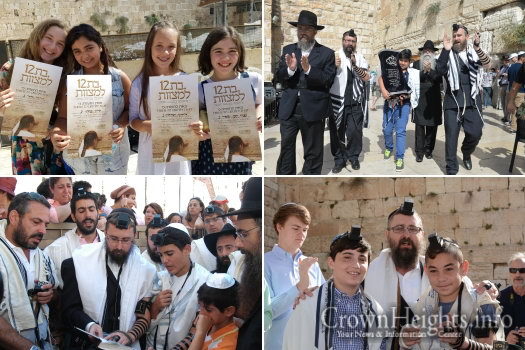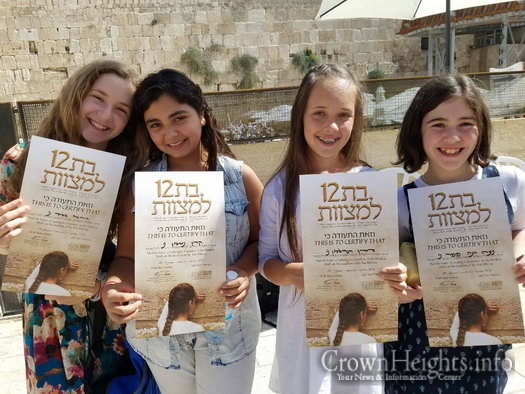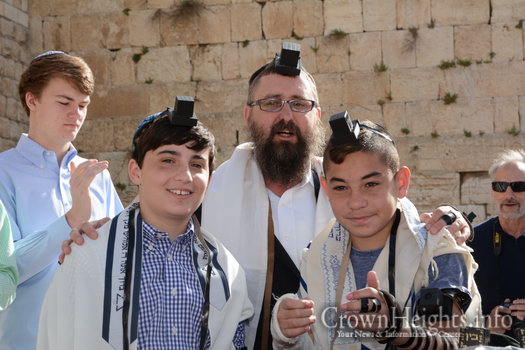
Survivors of Terror: Israel’s Double Orphans Grow Up
by Rena Udkoff – Lubavitch.com
Since Biblical times, the Jewish people have been inextricably bound up with the Land of Israel. In the days of King Solomon, when the Jews enjoyed a period of peace and tranquility, they were described as living “in safety, every man under his vine and his fig tree, from Dan to Beersheba, all the days of Solomon.” Kings 1 4:25.
The same imagery is employed by the prophet Micah, in his foretelling of a future when “everyone will sit under their own vine and under their own fig tree, and no one will make them afraid.” For Israel’s survivors of terror, especially its children who’ve lost both parents to the bloodlust of its enemies, and its parents who’ve lost children, the promise of peace comes late. The sobering words of our sages, that “Israel is secured through suffering,” ring painfully true to them.
Yet some survivors continue to nurture a fierce bond with the Holy Land. In this article, we look at what happens when children lose both parents to terror. We consider the grandparents who are left to raise the surviving children—often infants—and the children, double orphans, scarred forever by the insanity of hatred that has destroyed their families. Scarred, but not defeated.
Ro’ee is a bright, energetic 14-year-old boy living in Jerusalem. He has dozens of friends at his yeshiva high school where he studies Torah at an advanced level. His grandfather loves to boast about his academic successes. The young man has big dreams for the future and has set impressive goals for himself.
But Ro’ee is not your average teenager. Last year, his bar mitzvah at Israel’s Western Wall made national, and even some international, headlines. His last name became known in Israel and to thousands around the world when his parents and siblings were slaughtered in their home by Arab terrorists.
It was one of the most gruesome murders in recent Israeli history. Six years ago, on Friday night of March 11, 2011, the Fogel family was peacefully sleeping in their beds in Itamar, a settlement in Israel’s Samaria region. Ro’ee’s sister, Tamar, who was twelve years old at the time, was out late at a youth group meeting. Two terrorists entered the Fogel home and stabbed to death parents Ehud (Udi) and Rut, and children Yoav, 11, and Elad, 4. Hadas, the youngest, a three-month-old baby was gruesomely murdered.
When Tamar returned home that evening, she found the door locked—a sign that something was wrong. She woke up eight-year-old Ro’ee through his bedroom window and urged him to unlock the front door. Tamar entered a horror scene of bodies and blood. Her two-year-old brother, Yishai, was lying next to his bleeding parents, crying and shaking them with his hands, trying to get them to wake up.
Photos of the massacre elicited widespread horror not only in Israel, but around the world. In the Arab media, the attack was lauded as a “heroic operation.” Family members of the murderers described their relatives as “heroes” and “legends.”
In short time, the headlines faded. Neighbors, friends and whole communities, as well as various organizations dedicated to aiding survivors of terror kicked in. Long after the cameras have left the scene, and long after it seems that some semblance of “normal” has settled in for the victims, the nightmare continues.
“Churban Bayit:” The Destruction of a Home
Since the start of the so-called “First Intifada” in 2000, twenty-four families have lost both parents to a terror attack. For some, the pain is fresh. Eitam and Na’ama Henkin were killed in front of their four children less than two years ago, on October 1, 2015, when terrorists sprayed their vehicle with gunfire. Two years ago or ten years ago, the pain, say survivors, never goes away. It becomes a lifelong accompaniment.
Eleven years earlier, in December of 2000, Talia Kahane, 31, a childhood classmate of Rut Fogel, and her husband Binyamin Ze’ev Kahane, 34, were driving to their home in Kfar Tapuach when Arab snipers opened fire on their car. Minutes before the attack the couple had dropped off their 9-year-old son, Meir David, at Beit-El where he attended school. The couple’s five daughters, aged two months to 10 years, were in the car. Binyamin Ze’ev was killed instantly by a bullet to his neck and he lost control of the car. Talia, who was in the back seat with the infant, reached forward to grab the wheel, when she was shot as well. The car overturned, injuring some of the young girls. Talia was critically injured and died in the ambulance en route to Hadassah Hospital in Jerusalem. The orphaned girls survived and made a full recovery.
Aviva Herzlich, Talia’s mother, remembers feeling numbed by shock when she heard the news. “It was like a punch in the gut. I couldn’t think, I couldn’t breathe.” She immediately left her home in Tzfat and rushed to her grandchildren and has been with them ever since. Kahane’s six children, Yehudit Leah, Meir David, Batya, Tzivya, Rivkah, and Shlomtziyon, were adopted by Talia’s younger sister and her husband who have eight children of their own. Herzlich lives next door. Talia’s sister, who also had an infant at the time of the attack, nursed two-month old Shlomtziyon together with her own child.
After the attack on their family home, the three surviving Fogel children, Tamar, Ro’ee and Yishai, were immediately adopted by their mom’s parents, Yehuda and Tali Ben Ishai, who have been raising them for the past six years. Yehuda, who lost his daughter, son-in-law and three beloved grandchildren in one day, says the surviving children gave him and Tali a reason to live.
“When you look at what happened with clear eyes, you can feel the utter devastation. It was literally a Churban Bayit like they refer to the Beit HaMikdash [Holy Temple]. To take a father, mother and three innocent children is to completely destroy a home,” he explains. “What we went through could permanently break many families.”
For Herzlich, sixteen years have passed since her children’s murder. The two oldest Kahane girls have since married and are building homes of their own. Though she remains optimistic about the future, she is still tested every day.
“The pain will be there forever. It leaves an indelible mark. We always feel the lack in our lives and miss them every day,” she says. “You learn to live despite the pain and the longing.”
Jay Litvin, who established and ran Chabad’s Terror Victims Project (CTVP) in Israel prior to his passing, wrote, “while we tend to think of terror as that moment when the bus explodes or the bullet is fired, terror can continue its ripple effect, like a shockwave without end, well into the future. There is no ‘road map’ to the end of terror for those who are already its victims. There is no hudna, no truce, no peace for the mothers and fathers, the children, the bereaved who continue to suffer as if the attack was yesterday or will, in their psyche, be again tomorrow.”
For many victims and the families left behind, the world was turned upside down and inside out in an instant. For young children, faith and trust in the safety of the world, in its very goodness, are brutally shattered. “While ‘diplomatic solutions’ are sought to end this possibility for the future, for the terror victim, the past remains the present and is moment by moment being projected into tomorrow,” wrote Litvin.
Rabbi Menachem Kutner, current director of the CTVP, notes that more than 3,000 victims and their families continue to need support and comfort years after their lives were first affected by terror. When an attack happens, CTVP sends an emergency response team to the site of the attack to determine how they can be of best assistance.
But, say CTVP representatives, the real assistance is needed several days after the attack, when many of the wounded return home from the hospital to the havoc that now awaits them. By now, says Kutner, he and his team have unfortunately learned to assess the level of assistance survivors will need in the weeks and months to come, by their initial visits with them while they are still hospitalized.
“Some families will need moral support, others will need hot meals delivered and several basic needs looked after for them, and still others will need financial assistance on a large scale to get their lives back together,” he says. In addition to providing their own assistance, CTVP volunteers help survivors navigate Israel’s bureaucratic National Insurance Institute to receive the assistance they need for medical expenses, rehabilitation, and pension.
CTVP helps bereaved families with funerals, the shivah week, and the days and weeks following, when the reality of their loss sets in. “We stay with these families as long as they need us,” Kutner says. “There is no end point to our help except the family’s ability to re-enter their lives successfully.”
A Life Altered
In the days and years following the Kahanes’ murder, Herzlich busied herself with the day-to-day care of her grandchildren to the exclusion of all else. Her son, Talia’s brother, was completing his IDF service when his sister was killed. “In those days, the trauma was so overwhelming I could not function as a mother.” Her son, she says visibly pained as she reflects on those first days of utter chaos, struggled to stay afloat without the benefit of adequate support.
Today, at 34, he continues to live with the trauma. Another brother coped by diving headfirst into his work, his own young children witness to their father absent in all but the flesh. “He dealt with his pain by just working late into the night and trying to lose himself in his work. His children suffered from the loss too.” The ripple effects of the terror left yet another family traumatized in its wake.
“We all dealt with our trauma in different ways,” Herzlich recalls. “For ten years, we could not even talk about it. I didn’t say a word. We were trying to protect the children.” The elephant in the room was ignored, as each child, sibling and parent struggled with the overwhelming emotions of loss, anger and fear.
But life continues even in the face of unbearable pain. “After a decade, we finally started to put our lives back together. For the first time, I could start talking about it.” In time, the family sought and received the emotional help they needed. The combined Bloch (Talia’s sister’s family), and Kahane children became a single-family unit, and the love and support of the community brought much needed healing.
“Whenever I am with them, I just try to hug them, to let them know I am here and am never leaving them,” says Herzlich. The two eldest Kahane daughters, who are now married with children of their own, have each pursued a career in psychology and therapy, hoping to use their personal experience of pain to help others.
The Ben Ishais day-to-day reality has changed as well. Tali and Yehuda have taken on every aspect of child-rearing the surviving Fogel children, from daily school drop off and parent teacher conferences to navigating the teenage years.
“It is not easy to go back to being parents,” says the grandfather. On the other hand, the responsibility to tend to the practical needs of the children has given him and his wife a path forward. “We look at the children and we know that it’s not all over.”
Yishai, who was just two when his parents were killed, doesn’t remember his mother. For him, his grandmother is his mother. “We tell him about his mother and he knows he has an ima in heaven,” explains Yehuda. “But for him, his mother is my wife, who spoils him and loves him and cares for him.”
As the oldest, Tamar has the most memories of her parents. One month before their deaths, Udi and Rut threw her a large bat mitzvah party, a memory she treasures to this day. “It was like a parting gift to her. They taught her all the fundamentals for living a meaningful Jewish life. She wants to take everything she knows about her parents, and everything they taught her into her life as an adult,” explains Yehuda. Today, the 18-year-old is fulfilling her duties in the Israeli National Service. “It is very important to her to talk about her mother. She is determined to continue her parents’ legacy.”
Ro’ee’s tragic circumstances have built a deep inner strength, Yehuda relates. At his bar mitzvah he delivered a passionate speech about overcoming fear and the strength of the Jewish people. “When you don’t think of yourself as just being a part of a family but as part of the whole Jewish people, you’ll never be afraid of any challenge,” he told his bar mitzvah audience. “We have to carry on as a strong Jewish nation.”
Ro’ee’s wants to be strong for others. “The children do not want to be pitied,” says his grandfather. “They want to be normal. But they have special strengths to overcome the hand they have been dealt in life. Nothing about their lives is normal.”
Choosing Faith, Choosing Life
On Pesach 2011, a month after the attack, the Fogels and Ben Ishais gathered around the Seder table just trying to get through the day. Eight-year-old Ro’ee turned to his grandfather and told him that they needed to make a Misibat Hodaya, a thanksgiving celebration. The grandfather was surprised by the statement, but Ro’ee insisted. “We were saved! We need to thank G-d for that miracle,” he said. And so, despite their staggering loss, the family made a party thanking G-d for the miracle of their three grandchildren’s survival.
“I don’t know how people who do not have faith or do not have a strong support system like we did, could possibly survive such a traumatic blow,” says Herzlich. “There are wounds in our hearts that will never heal. They may close slightly but the deep, deep pain will always be there. The only thing that keeps us going is our faith in the eternal soul and our hope to someday see them again.”
The families make a conscious decision to choose life. “It strengthens us to know that our faith can help others and that Udi and Rut did not die in vain,” says Yehuda. “There is a purpose and reason in the huge toll we have paid. So many were inspired by their lives and have gone on to become better people because of them.”
To this day, people continue to talk about the Fogel’s lives and remember those who were viciously murdered for being Jewish in the Jewish homeland. Physical reminders of their loved ones also give the family hope. A yeshiva and a synagogue have been built in memory of those killed. Yehuda’s newborn granddaughter was named Rut.
But the most enduring legacy, of course, are the children, especially when they find a way out of the depths of sorrow, to grow and live purposefully. “As grandparents,” says Yehuda, “we are just awed by them. They give us such joy with their successes and accomplishments. Our task is simply to facilitate their lives by helping them as much as possible. We try not to get in the way. They are blossoming where they have been planted.”


















